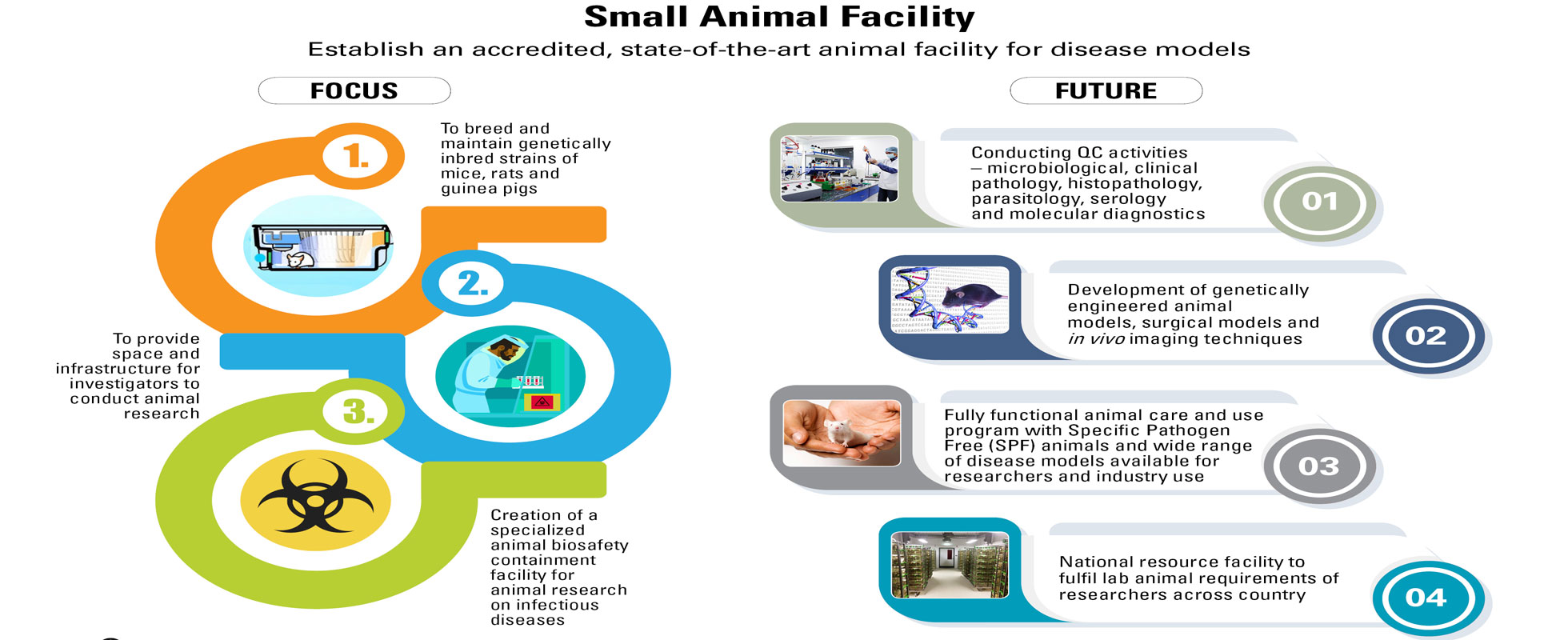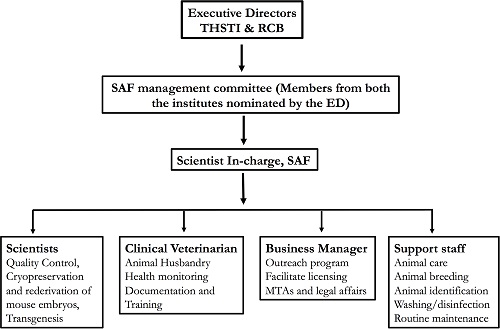Research Facility : EXPERIMENTAL ANIMAL FACILITY

Overview
Use of animal models for preclinical studies has been the backbone of both basic and translation research in the area of health sciences. Challenging hypothesis essential to understand complex biological processes necessitates holistic approach requiring advanced animal models. Most of these models are developed using genetically modified mouse. Application of these animal models in scientific research is common and a necessity in an organization involved in translational research. A very diverse translational research landscape at the NCR Biotech Science Cluster involving studies in the area of both communicable and non-communicable diseases mandates the requirement of different animal models that helps the researchers validate both their clinical as well as basic research findings.
In line with this vision, in 2008, the Department of Biotechnology, when initiating the process of creating two major research institutes viz. THSTI and RCB in NCR Biotech Science Cluster (BSC) at Faridabad, proposed to build a state-of-the-art Small Animal Facility (SAF) to facilitate animal experimentation for the scientific community of this cluster. The SAF at THSTI, NCR Biotech Science Cluster was established with the support from Department of Biotechnology (DBT) project grant/sanction order no. BT/PR5480/INF/22/158/2012 dated 31.03.2014. SAF is aimed at providing support to researchers of biological sciences at THSTI & RCB to perform animal studies through the routine breeding, maintenance and supply/issuance of required laboratory animals. Further, SAF also help researchers in establishing novel animal model platforms by providing assistance in executing both invasive and non-invasive protocols.
The SAF was established in compliance with the guidelines of the Committee for the Purpose of Control and Supervision of Experiments on Animals (CPCSEA), Ministry of Fisheries, Animal Husbandry and Dairying, Department of Animal Husbandry and Dairying, Government of India and registered with CPCSEA vide registration number 1685/GO/ReBi/S/2013/CPCSEA. Studies requiring animal research are only conducted after due approval of the Institutional Animal Ethics Committee (IAEC) (https://thsti.res.in/newthsti/en/Committee)
Objectives
1. To breed and maintain genetically defined laboratory animals
2. In-house supply of quality experimental animals required for ongoing research projects at THSTI and RCB
3. To provide logistic and veterinary related support to the investigators for executing animal related studies
4. To execute routine health, genetic and environmental monitoring of animals at regular intervals to maintain the quality control standards
5. Provide necessary trainings required in the field of laboratory animal practices
6. To create and maintain a specialized animal biosafety containment area for research on infectious diseases
7. To help develop novel animal model platforms for facilitating both basic and translational research
Facility layout and Infrastructure
The facility has a total built up area of ̴ 4939.69 square meter spread over ground plus three floors. The ground floor mainly serves as a support area to the remaining floors. It consists of change rooms, quarantine room, stores, offices, lab area, wash/autoclave area, clean processing and storage areas. The remaining three floors are dedicated for animal housing and animal related work. Each floor is identical in design and has a floor area of ̴ 1230.38 square meter. These floors have a clean and two dirty corridors in place for the movement of personnel and related animal supplies. Each floor has a capacity to house approximately 20,000 to 25,000 mice or 10,000 to 15,000 rats at a given point of time after necessary housing arrangements are made. There is dedicated procedure room to perform animal related procedures. These rooms are equipped with necessary equipment like in-vivo imaging system, anesthesia system, euthanasia system, biosafety cabinets, etc. There are defined routes for material, animal and human movements to prevent cross contamination. Environmental conditions are maintained in animal rooms in accordance with the CPCSEA guidelines include the temperature of 19 to 26oC, relative humidity 30 to 70%, the 14 hours light and 10 hours dark cycle, minimum 12 to 15 air changes per hour shall be maintained in the animal rooms with the provision of centralized air conditioning system. The light intensity and sound level in the animal rooms are maintained less than 400 lux and less than 85 decibel respectively.
The facility started its operations since September 2016 and at present houses rat, guinea pig and hamster as one stock each and 41 mouse strains that include inbred, transgenic, knock-out, knock-in and immunodeficient strains. The animal rooms are equipped with cage changing stations, biosafety cabinets and laminar airflow units for cage changing and animal handling. Individually ventilated caging (IVC) systems are in place for housing the laboratory animals to reduce the chance of contamination. The wash area of the facility is equipped with electrically operated heavy duty, large capacity hydro spray automated cage, rack and bottle washer and bedding disposal station to safeguard and protect personnel from animal allergens and contaminants while cleaning the used animal cages. Sterilized feed, water and bedding material are being used to maintain the animals in healthy state. In addition to autoclaving, the acidification of drinking water is being implemented to maintain the quality of drinking water for the housed animals. Appropriate standard operating procedures are being followed for animal handling and animal related procedures. The access to the facility is controlled and restricted using access card system. An appropriate CCTV surveillance monitoring is being followed in the facility. The animal facility records are being maintained in accordance with the CPCSEA guidelines. The standard animal quality control measures such as routine health, genetic and environmental monitoring are being followed to ascertain the quality of the animals housed in the facility. A separate animal room is available inside the small animal facility to carry out animal infection studies that involves biosafety level 2 pathogens. The facility also conducts the trainings on animal care, handling and experimental techniques for staff and researchers.
Infectious Disease Research Facility (IDRF) located on the 3rd floor of the SAF building is a specialized animal biosafety level III containment facility (ABSL3 facility) that caters to the need of researchers actively involved in research on infectious diseases involving biosafety level 3 pathogens such as COVID-19, Tuberculosis and HIV.
Ferret Facility: Recently, a ferret holding and experimentation facility was inaugurated to support the research on respiratory viruses such as Influenza viruses.
Key Features
- Total built up area ̴ 4939.69 square meter spread over ground plus three floors
- Clean and dirty corridor system
- Restricted and controlled access
- Air showers at entry
- CCTV surveillance monitoring
- Lab animal housing only in individually ventilated caging system
- Dedicated procedure rooms
- In-vivo imaging system
- Genetic, health & environmental monitoring program
- Standard operating procedures for all animal related procedures
- Dedicated animal room for animal experiments of infectious nature which does not require the ABSL-III and above level containment
- Infectious Disease Research Facility (IDRF) as a specialized animal biosafety level III containment facility to perform research on infectious diseases such as COVID-19, Tuberculosis and HIV
- Automated cage, rack and bottle washer for automation of washing operations
- Double door autoclaves
Supporting Areas of Research
Currently, the SAF at the NCR cluster has facilitated the development of animal model platforms to support research in the following areas:
- Auto-immune diseases
- Infectious diseases
- Cancer biology
- Gut inflammation
- Cardiovascular and metabolic disorders
- Muscle development and disorders
- Hemolytic diseases
- Neuroscience
- Governance

Name of faculty members and Scientists
DR. AMIT AWASTHI, SENIOR PROFESSOR
DR. AMIT KUMAR PANDEY, PROFESSOR
DR. SANTOSH S. MATHAPATI, ASSOCIATE PROFESSOR
DR. BHISMA NARAYAN PANDA, SCIENTIST D
The centre/facility is open to providing services to academia and industry. For any queries, contact the following
Contact Details
Dr. Amit Awasthi
 aawasthi@thsti.res.in
aawasthi@thsti.res.in
 0129- 2876482
0129- 2876482
Dr. Amit Kumar Pandey
.png) amitpandey@thsti.res.in
amitpandey@thsti.res.in
.png) 0129- 2876322
0129- 2876322
Dr. Santosh S. Mathapati
.png) santosh@thsti.res.in
santosh@thsti.res.in
.png) 0129- 2876348
0129- 2876348

